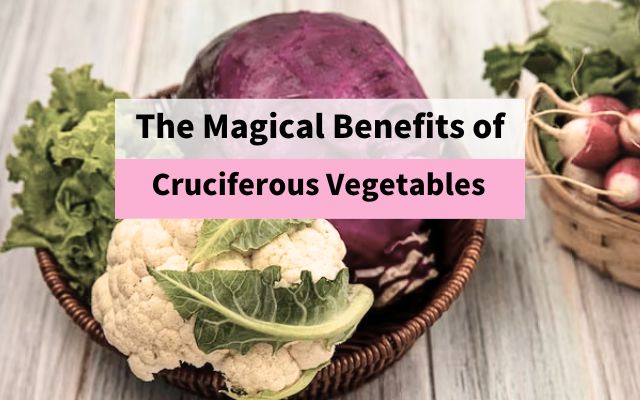What Are Cruciferous Vegetables? Cruciferous veggies are the everyday superheroes in our diet! Think cauliflower, broccoli, cabbage, mustard greens, and more. These guys are loaded with essential vitamins and minerals, and they’re not just good for you – they taste great too!
So, what’s the deal with cruciferous vegetables?
Cruciferous vegetables are a type of plant that belongs to the Brassicaceae family (cruciferous vegetables in English: Cruciferous Vegetables). This vegetable usually has petals arranged in a cross-shaped pattern, hence its name.
There are many types of cruciferous vegetables, including many that are commonly consumed in our daily diet, such as cauliflower, broccoli, cabbage, mustard greens, arugula, rapeseed, and more. These vegetables are rich in vitamin C, dietary fiber, minerals, antioxidants and other nutrients, which are very beneficial to maintaining good health.

What are cruciferous vegetables?
Cruciferous vegetables include many common vegetables in our daily diet. Here are some of the more common cruciferous vegetables: (1)
| Arugula | Chinese cabbage | Broccoli |
| Brussels sprouts | Cabbage | Cauliflower |
| Chinese cabbage | Kale | White radish |
| Turnip | Mustard | Watercress |
Why should you care about cruciferous veggies?
Well, these veggies come with a bunch of perks:
1. Help prevent cancer
They’re loaded with antioxidants, which help kick those free radicals to the curb, reducing cancer risk.
2. Gut-Friendly
The fiber in them keeps your digestive system humming along, preventing constipation and even colon cancer.
3. Protect cardiovascular system
Compounds like sulfides and isothiocyanates lend a hand in lowering cholesterol, keeping your ticker in top shape. (2)
4. Immunity Boosters
They’re packed with vitamins C, K, and more, giving your immune system a boost and keeping the bad bugs at bay.
5. Helps lose weight
Low in calories but high in fiber, they help you feel full, curb overeating, and support weight management.
6. Protect your eyes
Cruciferous vegetables contain large amounts of ingredients such as lutein and zeaxanthin, which can protect the eyes, slow down eye aging, and prevent eye diseases. (3)
7. Helps bone health
Calcium, magnesium, and vitamin K help keep those bones strong and prevent osteoporosis.
8. Reduce diabetes risk
The fiber helps manage blood sugar and insulin levels, reducing diabetes risk.
9. Anti-inflammatory and antibacterial
They’re full of bioactive substances that tackle inflammation and infection.
10. Helps improve liver function
They help the liver regenerate and improve its function.
In a nutshell, these veggies are like little bundles of health magic. And when it comes to cooking them, let your taste buds guide you to delicious and nutritious creations!
Nutrition of Cruciferous vegetable
These veggies are a treasure trove of nutrients:
- Vitamin C: Boosts your immune system, helps with iron absorption, and keeps wounds healing.
- Dietary Fiber: Good for your gut, keeps cholesterol in check, and regulates blood sugar.
- Vitamin K: Helps with blood clotting and bone health.
- Sulfide: Supports liver detox and repair.
- Glucosinolates: Turn into isothiocyanates to prevent cancer.
- Lutein and Zeaxanthin: Guard your eyes and slow down aging.
- Carotene: Converts to vitamin A for healthy skin, mucous membranes, and vision.
- Sulfonamides: Boost your immune system and fend off diseases.
- Potassium: Balances water, nerve, and muscle functions.
- Phosphorus: Vital for bones and teeth.
- Magnesium: Keeps your nervous and cardiovascular systems happy.
- Iron: Essential for red blood cell production and anemia prevention.
Cruciferous vegetables are rich in many nutrients and are an integral part of a healthy diet. At the same time, different types of cruciferous vegetables also have different nutritional contents, so they can be diversified in the diet to obtain the maximum nutritional value.
Can cruciferous vegetables prevent cancer?
Cruciferous veggies are like the unsung heroes in the fight against cancer. Packed with sulfides, isothiocyanates, flavonoids, and vitamin C, they’re your allies in keeping cancer at bay. These superheroes also contain glucosinolate, which transforms into isothiocyanates, helping prevent cancer. (4)
Studies suggest that a steady diet of cruciferous veggies can lower the risk of common cancers like esophageal, colon, and prostate cancer. Some even say they can reduce breast cancer risk by regulating hormone levels and preventing DNA damage.
In addition, cruciferous vegetables also contain a compound called Indole-3-Carbinol (I3C), which can regulate hormone levels and reduce the stimulation of breast cells by estrogen, thereby preventing the occurrence of breast cancer.
In addition, the glucosinolates in cruciferous vegetables can prevent cancer by reducing DNA damage and maintaining gene stability.
While more research is underway, it’s pretty clear that these veggies have some cancer-fighting chops. So if you’re looking to reduce your cancer risk, load up on these green powerhouses!
How to Pick the Best Cruciferous Veggies:
When shopping for cruciferous veggies, keep these tips in mind:
- Look for vibrant colors and smooth, undamaged surfaces.
- Give them a firm squeeze – they should feel just right, not too soft or too hard.
- Trust your nose – they should have a fresh, natural aroma, not any funky odors.
- Be in tune with the seasons – different veggies shine at different times of the year.
- Personal preference matters – choose the ones you love!
Select your cruciferous veggies wisely based on appearance, feel, smell, season, and what tickles your taste buds!
How to cook cruciferous vegetables
Ready to whip up some cruciferous goodness? Check out these simple recipes:
1. Roasted Coconut Cauliflower:
- Cut cauliflower into florets.
- Mix coconut oil, salt, pepper, garlic, and onion powder.
- Coat the cauliflower, add shredded coconut, and bake until golden brown.
- Cauliflower and Mushroom Soup:
- Sauté onion and garlic, then add cauliflower and mushrooms.
- Simmer with water or veggie broth, blend until smooth, and season to taste.
- Broccoli Scrambled Eggs:
- Sauté broccoli, add beaten eggs, and stir-fry until cooked.
- Add some garlic, salt, and pepper for flavor.
2. Cauliflower and Mushroom Soup
- Chop up the cauliflower into small pieces and give them a good rinse. Slice those mushrooms too.
- Heat up the olive oil in a pan over medium heat. Toss in the chopped onions and minced garlic. Cook until they turn golden, about 5 minutes.
- Add your cauliflower and mushrooms and let them cook until they get soft, which takes about 5 minutes.
- Pour in the water or vegetable broth and bring it to a boil. Then, reduce the heat to medium-low and let it all simmer for 10-15 minutes.
- Time to blend things up! Pour the soup into a blender and blitz it until it’s nice and smooth.
- Pour your creamy soup back into the pot and stir in some butter, salt, and black pepper. Keep it on the heat until it boils again.
- Grab a bowl, sprinkle some black pepper on top, and dive into your delicious cauliflower and mushroom soup!
3. Broccoli Scrambled Eggs Recipe
- Take that broccoli and cut it into small florets. Give them a good rinse.
- Crack those eggs into a bowl, add some salt and black pepper, give it all a good mix, and set it aside.
- Heat up the vegetable oil in a pan, then toss in the minced garlic. Sizzle it up for about 10 seconds until it’s smelling good.
- Add the broccoli to the pan, stir it all around, and let it cook for about 2-3 minutes until the broccoli gets nice and soft.
- Now, pour that egg mixture right into the pan and keep stirring until those eggs are all cooked up.
- Turn off the heat, scoop out your yummy broccoli scrambled eggs, and serve it over some rice or as a tasty side dish. If you’re feeling adventurous, throw in some onions, carrots, or other veggies for extra flavor and nutrition!
Bottom Line
What are cruciferous vegetables? There’s cauliflower, broccoli, cabbage, kale and more. These vegetables are not only delicious, but also rich in nutrients and have many benefits for the human body, such as enhancing immunity and preventing cancer. When selecting and cooking, attention should be paid to quality and healthy cooking methods. Whether eaten raw, boiled, steamed, grilled or stir-fried, these vegetables are a nutritious, healthy and delicious choice.


